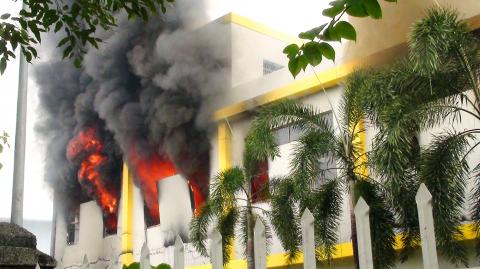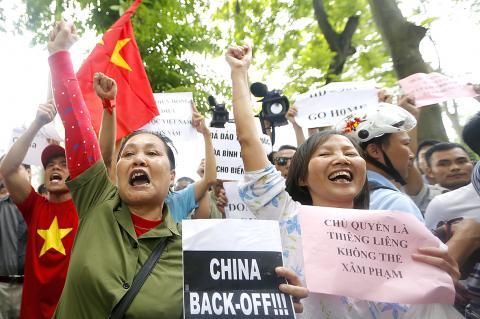Thousands of Vietnamese set fire to foreign factories and rampaged in industrial zones in the south of the country in an angry reaction to Chinese oil drilling in a part of the South China Sea claimed by Taiwan, Vietnam and China, officials said yesterday.
The brunt of Tuesday’s anti-China violence appears to have been borne by Taiwanese companies in the provinces of Binh Duong and Dong Nai that rioters mistook as being Chinese-owned.
The row over the South China Sea was sparked by Beijing’s movement of an oil rig near the Paracel Islands (Xisha Islands, 西沙群島) last week. The Paracels are claimed by Taipei, Hanoi and Beijing.

Photo: AFP
The anti-China violence in Vietnam has brought relations between Hanoi and Beijing to one of their lowest points since the Communist neighbors fought a brief border war in 1979.
“I fear a dark chapter in Sino-Vietnamese relations is now being written and because China wants to keep that oil rig in place into August, these protests could just be the first pages,” said Ian Storey, a expert on the South China Sea at Singapore’s Institute of Southeast Asian Studies.
Binh Duong People’s Committee vice chairman Tran Van Namb said the workers’ protests were initially peaceful, but disorder broke out when their numbers swelled to about 20,000. Gates were smashed and rioters set 15 factories on fire, he said.

Photo: EPA
“This caused billions of dong [hundreds of thousands of dollars] in damages and thousands of workers will have lost their jobs,” Nam said by telephone. “We urge everyone to stay calm, exercise restraint and have faith in the leadership of the [Vietnamese Communist] Party and State.”
A Binh Duong police official said by telephone that about 200 people had been arrested, adding: “We are working on other areas in the province... We haven’t seen any injuries.”
A Singaporean Ministry of Foreign Affairs spokesman said that the premises of a number of foreign companies in two Vietnam-Singapore joint venture industrial parks in Binh Duong had been broken into and set ablaze.
Chinese Ministry of Foreign Affairs spokeswoman Hua Chunying (華春瑩) told reporters that China was seriously concerned about the violence and had summoned Vietnam’s ambassador to protest.
Beijing has “demanded the Vietnamese side make efforts to adopt effective measures to resolutely support eliminating illegal criminal acts and protect the safety of Chinese citizens and institutions,” Hua told reporters.

INVESTIGATION: The case is the latest instance of a DPP figure being implicated in an espionage network accused of allegedly leaking information to Chinese intelligence Democratic Progressive Party (DPP) member Ho Jen-chieh (何仁傑) was detained and held incommunicado yesterday on suspicion of spying for China during his tenure as assistant to then-minister of foreign affairs Joseph Wu (吳釗燮). The Taipei District Prosecutors’ Office said Ho was implicated during its investigation into alleged spying activities by former Presidential Office consultant Wu Shang-yu (吳尚雨). Prosecutors said there is reason to believe Ho breached the National Security Act (國家安全法) by leaking classified Ministry of Foreign Affairs information to Chinese intelligence. Following interrogation, prosecutors petitioned the Taipei District Court to detain Ho, citing concerns over potential collusion or tampering of evidence. The

‘FORM OF PROTEST’: The German Institute Taipei said it was ‘shocked’ to see Nazi symbolism used in connection with political aims as it condemned the incident Sung Chien-liang (宋建樑), who led efforts to recall Democratic Progressive Party (DPP) Legislator Lee Kun-cheng (李坤城), was released on bail of NT$80,000 yesterday amid an outcry over a Nazi armband he wore to questioning the night before. Sung arrived at the New Taipei City District Prosecutors’ Office for questioning in a recall petition forgery case on Tuesday night wearing a red armband bearing a swastika, carrying a copy of Adolf Hitler’s Mein Kampf and giving a Nazi salute. Sung left the building at 1:15am without the armband and apparently covering the book with a coat. This is a serious international scandal and Chinese

Seventy percent of middle and elementary schools now conduct English classes entirely in English, the Ministry of Education said, as it encourages schools nationwide to adopt this practice Minister of Education (MOE) Cheng Ying-yao (鄭英耀) is scheduled to present a report on the government’s bilingual education policy to the Legislative Yuan’s Education and Culture Committee today. The report would outline strategies aimed at expanding access to education, reducing regional disparities and improving talent cultivation. Implementation of bilingual education policies has varied across local governments, occasionally drawing public criticism. For example, some schools have required teachers of non-English subjects to pass English proficiency

TRADE: The premier pledged safeguards on ‘Made in Taiwan’ labeling, anti-dumping measures and stricter export controls to strengthen its position in trade talks Products labeled “made in Taiwan” must be genuinely made in Taiwan, Premier Cho Jung-tai (卓榮泰) said yesterday, vowing to enforce strict safeguards against “origin laundering” and initiate anti-dumping investigations to prevent China dumping its products in Taiwan. Cho made the remarks in a discussion session with representatives from industries in Kaohsiung. In response to the US government’s recent announcement of “reciprocal” tariffs on its trading partners, President William Lai (賴清德) and Cho last week began a series of consultations with industry leaders nationwide to gather feedback and address concerns. Taiwanese and US officials held a videoconference on Friday evening to discuss the